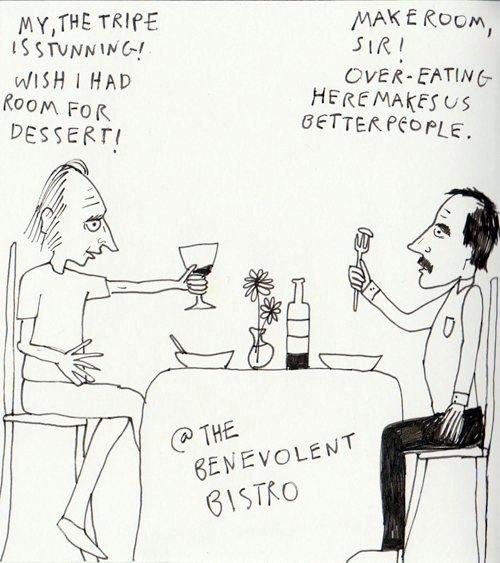
When it springs to life in the old El Herradero space on Mission at 18th, presumably early this summer, Commonwealth will be "a progressive American restaurant, building on California's tradition of showcasing local, seasonal foods while incorporating diverse culinary approaches from around the world." Many, many San Francisco restaurants plaster that sort of thesis statement across their websites. While it's pegged as an "innovative model of benevolent fine-dining...committed to benefiting our community," in which "a set portion of proceeds from [Chef Jason] Fox’s inventive tasting menus will be donated to local non-profits," none of Commonwealth's p.r. literature refers to the eatery-in-process as a charity exactly.
A free, potentially unreliable online dictionary defines charity: "Provision of help or relief to the poor; almsgiving; something given to help the needy; alms; an institution, organization, or fund established to help the needy; benevolence or generosity toward others or toward humanity; indulgence or forbearance in judging others." As applied to the restaurant world, the word takes a lot of different tacks. Jamie Oliver's Fifteen foundation trains disadvantaged youth to run a growing empire of restaurants. Since 1991, San Francisco's Delancey Street Foundation has run a vocational training program around its restaurant staffed by residents (often ex-convicts and former abusers of drugs and alcohol). Plenty of restaurants make a point of donating surplus food to banks and soup kitchens. I also think of Karma Kitchen, the three-year-old Berkeley cafe founded on the concept of pay-it-forward. Every meal is a "genuine gift" paid for by previous customers. The idea is that happy diners will then elect to become donors to allow subsequent visitors to enjoy the same nourishment and hospitality, and to perpetuate the cycle of trust, abundance, and community-awareness.
Though high-end big-ticket establishments occasionally throw a benefit bash situated around one holiday or another, most restaurants focused on helping others aren't overly preoccupied with pushing unique, gastronomically interesting meals. Relatively austere offerings such as dal and rice abound. I suppose that's why Commonwealth feels fresh -- even with brasserie Elmwood Cafe in Berkeley getting off to a good start last month. In an Eater S.F. bit posted the week before last, founder Anthony Myint laid out the mission pretty clearly:
"Basically, we're drawing on some aspects of [Mission Street Food], such as affordability and inventiveness of cuisine, and trying to make this a more consistent and sustainable business, which creates some revenue for local charities...[We're creating an] approachable fine dining atmosphere, focused on value-oriented food...The overall experience will be much more akin to fine dining than the sometimes charming, but often chaotic atmosphere at Lung Shan.”
Given the sprint-like pace at which cultural movements now gather speed, the idea that food can be an agent of positive change is not particularly new; the idea that a fine dining restaurant can -- and not just by sourcing produce from nearby farms or going "green" -- is, on the other hand, somewhat unprecedented. Eager "foodies" inevitably hover like locusts around any waves preparing to crash across the city's dining scene. Once street food emerged as a monster trend, the swelling popularity of carts and stands run not infrequently by unemployment check-cashing hobbyists helped draw positive attention to people with families depending on their fledgling Health Code-flaunting businesses for survival. They may compete with citizens who ten years ago might have worked at a dot com and snapped up SOMA lofts, but at least higher profiles and legitimacy loom closer for all, right? How appropriate to harness that reoccurring phenomenon with the intention of sharing profits with non-profit organizations bent on improving lives, not just lighting up the dining scene. Just as they do for Mission Street Food twice a week, lines will form around the block for Commonwealth when it opens. The lines will form partially because of the city's familiarity with Mission Street Food, but they will only stay if the restaurant is actually really good. Mission Street Food doesn't operate under the same pressure awaiting Commonwealth. It doesn't just appeal to people because it's a pop-up, or because its meals benefit charities. Each dinner is an opportunity to enjoy an unprecedented experience curated by a chef applying his learned techniques, background, and imagination to the concept. The chefs are usually relatively unheralded, and the meals give them an opportunity to garner more attention than they usually enjoy manning the sauce station at a celebrated restaurant with someone else's name on the menu out front. Imagine if Thomas Keller showed up one night with an army of assistants. The line would stretch up to Mount Davidson, but something would be lost all the same. Mission Street Food is a d.i.y. adventure with low prices to match. Dishes are executed with more consistency in a humming three-star kitchen with the same staff every night, but the spirit remains unique, lovably loose, with an invigorating, not unnerving, degree of uncertainty surrounding each dinner.